“Marriage bureaux have long been the butt of jokes and sketches, but in the age of Tinder hook-ups one might look back wistfully at their heyday in the last century. Penrose Halson, who ran the Katharine Allen Bureau herself for a time, became fascinated by the history and memoirs of Britain’s first Bureau, in the decade from its opening in 1939.”
Libby Purves, TLS
It is a chronicle of bright, independent young women who were themselves escaping the drearier marital routes: Audrey Parsons broke two engagements (unable to take her fiancé’s lectures on “wifely duties”) and worked as a delivery girl, riding teacher, dentist’s assistant and wholly unskilled yacht skipper. It was her Uncle George, a tea planter, who pointed out the need for an introduction bureau for young men home on leave from Empire – where marriageable girls were scarce – to meet the right sort of wife. She teamed up with a divorced mannequin, and changed her name to Mary Oliver as she brought into being her uncle’s idea. She saw that “young men vaguely expect that in some miraculous but unspecified way they will meet their dream girl”, while she is probably “sitting patiently in her parents’ home waiting for Mr Right”. Ergo. . .
They planned, interviewed and charged a small initial fee as well as an After Marriage Fee. “We had nobody to copy, no reference books.” But their fierce common sense and benign light-heartedness shine from every page of Halson’s account. They were accused of brothel-keeping and white slaving, but laid down sensible strict conditions, including a demand that the applicant meet the relatives and friends of the possible spouse. They found a decrepit office over a hairdresser’s, painted and set up. With a war looming.
Oddly, that helped. The press needed something less doomy to write about, so Godfrey Winn did a column and the populars piled in. Customers soon queued up the narrow stairs (several men tried proposing to the owners straight away). There were businessmen and shop girls, a plumber and an earl, clergymen and postmen, a rat-catcher and a cowman. One MP wanted “a lady, English, of good birth, educated by a governess or private school, C of E, Conservative, of independent means (through inheritance, not anything so vulgar as working), cultured, refined, in good health, well dressed, slim, not too brainy, single or widowed without children. They found a girl, poor thing, and got their 20 guineas.
The picture of young women desperate to escape home is touching; the expectations of men often ludicrously inflated. The gradations of snobbery are grand fodder for any social historian: Cedric, the rubber planter, like many, would not dream of a woman “in trade” but the first suitable one they found shuddered: “Frightful, truly frightful, his brain cavity is filled with rubber and his heart with copies of Debrett”. He then recoiled at a woman who had had an affair (“a fast, loose female”). Time was running out, for these imperial planters were always on a deadline, but up came the lank-haired, plain but determined Hon. Grizelda, keen to escape her dad the Earl and take anything a “as long as he’s not a lunatic or a savage”. She took on Cedric, making a sharp deal about paying him an allowance and “doing all in her power to produce a son and heir”. She wrote that she was ugly but rich, while he was ravishing, so “We are equal. And whenever I’m fed up with him I shall simply sit and stare at him”.
The War brought challenges, not least the requirement to declare foreign clients. When one cold-eyed German count clicked his heels Jenner and Oliver reported him and he ended up in jail. Some anecdotes are bizarre: a sheikh with a Welsh accent insisted on a bride with couture clothes and terrified a Mrs Pratt-Evans with his “grubby nightgown” and tame falcon. Then he grumbled because she was dressed by D.H. Evans, therefore common. An Irishman wrote just wanting a wife less bashful than the local Catholic girls.
Many of the wartime stories tell poignantly of the stress of hurried affairs, bereavements and desperate lone pregnancies. A rape victim did not know “if the father is my dearest love or a crook, pimp or deserter”. Her story ends better than one expects. So there’s a gold mine here of anecdote and personality from the foundresses’ journals, vividly enlightening about that decade. The bureau became a litmus paper for national mood: fear, Depression, rationing, the aftermath of war and the morale uplift of Princess Elizabeth’s marriage.
And don’t miss the Appendices, listing requirements people sent in. I like the woman who preferred engineers but would take anyone educated “except actors or theologists”, and the man who demanded “looks and voice of a Shakespearian heroine”. Better still, the “Interviewers’ Comments, especially “Gent, mad, amiable rotter, beard”. I’m sure I’ve met him.
“I thought this was going to be a frivolous romp through the frolicks of wartime matchmaking and, indeed, it is a book full of charm and hilarity, written in a no-nonsense style by an accomplished writer and storyteller, but it adds up to far more than that. . . . So vividly does Penrose Halson write, quoting directly from letters and index cards, that you care about each mini love story, whether it’s sweet, impoverished Myrtle who eventually finds her soulmate in the delightful Irishman Rory O’Rawe or the adorable, sensitive Ivy and diffident Archibald BuIIin-Archer, whose love story ends in tragedy.”
Ysenda Maxtone Graham, Country Life
Imagine if, at the headquarters of today’s internet dating agencies, there were two wise, compassionate, practical ladies who really thought about the men and women searching for love and had sudden brainwaves about who simply must be introduced to whom. Wouldn’t the world be a happier place?
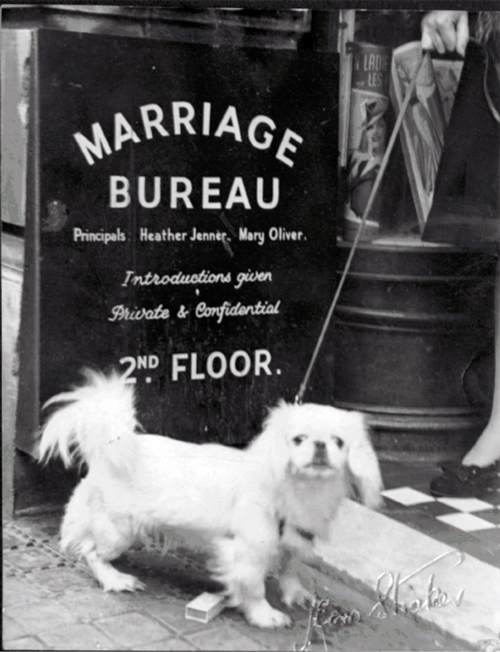
Heather Jenner’s dog (Blanche or Cupid) outside the office entrance in Bond Street
This was what I couldn’t help thinking while reading this fascinating true story of the Marriage Bureau at 124, New Bond Street, founded in 1939 by two young ladies, Mary Oliver and Heather Jenner. I thought this was going to be a frivolous romp through the frolicks of wartime matchmaking and, indeed, it is a book full of charm and hilarity, written in a no-nonsense style by an accomplished writer and storyteller, but it adds up to far more than that.
It depicts the harsh world of the marriage market, only 75 years ago, when daughters in their early twenties were desperate to get away from deathly spinsterhood under their parents’ shadows and homesick men were desperate to find a nice young gal to fall in love with and marry during their short leave.
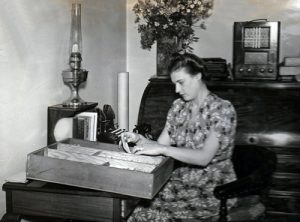
Heather ‘doing the mating’ at home, using the bureau’s client cards
The book contains hundreds of stories of successful and failed introductions, all presided over by the marvellous, unshockable ladies in the Bureau, including the grey-haired Dorothy Harbottle, known as Bottle, who chain-smoked and had an unfailing instinct for inspired introductions. So vividly does Penrose Halson write, quoting directly from letters and index cards, that you care about each mini love story, whether it’s sweet, impoverished Myrtle who eventually finds her soulmate in the delightful Irishman Rory O’Rawe or the adorable, sensitive Ivy and diffident Archibald Bullin-Archer, whose love story ends in tragedy. There’s always a sense of jubilation when a couple gets married – and not just because they pay the After Marriage Fee.
The ladies at the Bureau came up with shorthand terms to put on the index cards to denote the social classes of the people on their books: Lady and Gent, Near Gent and Near Lady, Gentish and Ladyish and then Working Class, divided into MBTM (much better than most ) and MBTS (much better than some).
It sounds a rather brutal system, but it worked, and introductions could certainly be made across social divides: an MBTM could be introduced to a Gentish and a Near Lady to a Gent.
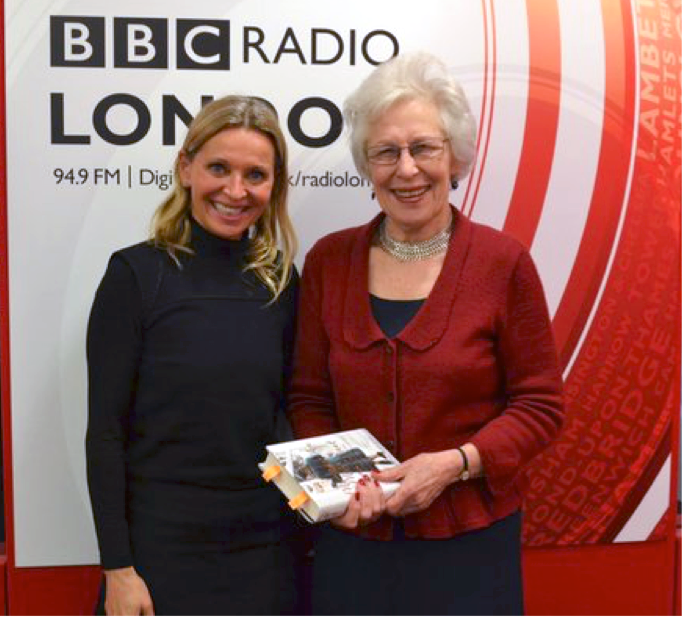
Nikki Bedi on Twitter:
“This is Penrose Halson. Marriages Are Made in Bond Street is her book. Such a vivid, rich history. Sure to go to TV!”
“This is a fascinating account of true stories from a 1940s marriage bureau started by two young and enterprising women: brigadier’s daughter Heather Jenner and farmer’s daughter Mary Oliver . . . The stories of the clients are riveting, but so too are those of the staff . . .”
Gillian Spickernell, The Lady
“The book is a period piece in some ways but, away from the different clothes and customs, it has a contemporary ring because fundamentally, people don’t change. Be it 1946 or 2016, we still worry about money, ailing parents, loneliness and finding someone to love. The makers of CaIl The Midwife need look no further for their next television project.”
Ginny Dougary, Daily Mail
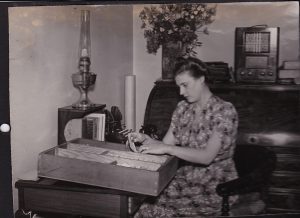
“Marriages Are Made in Bond Street is a warm and affectionate memoir based on Heather’s extensive client records. . . I thoroughly enjoyed reading the story of the Marriage Bureau and of the many couples whose lives were changed for the better because of it. It seems such a quaint idea today, but times were so different back then and the Bureau was very much a product of its time; a little slice of never-to-be-repeated history. Many thanks to the publishers for my copy of the book.”
Louise Jones, The Bookbag
“In her fascinating – if somewhat sugar-coated – account of the early years of Heather Jenner and Mary Oliver’s groundbreaking Marriage Bureau, Penrose Halson delivers a rare glimpse of life and love during and after the war. . . . Halson’s entertaining book – essentially light-hearted but illuminated by powerful flashes of human pain and tragedy – presents a remarkable cross-section of British society in the 1940s and serves as a compelling reminder that the runaway success of today’s internet matchmaking is just part of the age-old dating game.”
Pam Norfolk, Evening Post
“Apparently, a TV series is already in development, and it seems likely to be a roaring success, along the lines of Call the Midwife.”
Craig Brown, Mail on Sunday
“Glimpse into the matchmaking world of 1940s London with this delightful book.”
New Day
“The social history here is fascinating, especially given the timing of the bureau’s start just before the outbreak of war. Changing morals and a sense of carpe diem during the conflict added urgency and forthrightness to the proceedings.”
Claire Harman, Guardian
“… this charming book paints a nostalgic picture of 1940s London.”
Sophie Donnelly, Daily Express
“All strata of 1940s British society are here and their stories, happy and sad, make delightful reading.”
Choice
“Fascinating true stories from the proprietor of a marriage bureau founded in 1939.”
Cathy Rentzen, Prima
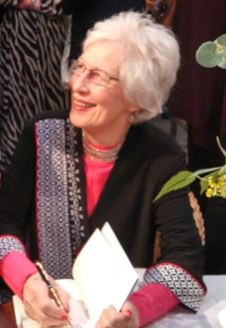
“I enjoyed my party in good company. Also read the book with great amusement. What a page turner.”
Rosie Levens after her 90th birthday party
“I absolutely loved it. It’s been a while since I read a book where I really empathized with the characters (way better than the books I am studying for my English A level!)”
Georgie Dick, 17
“Your fabulous book is a brilliant read, I enjoyed every page. Bitter-sweet, funny, fairly shocking at times! A fascinating insight into people’s ideas on marriage and romance or more often lack of romance!”
Hayley Martyn-Fisher
“I have just finished reading Marriages Are Made in Bond Street. I genuinely loved it from start to finish. Congratulations on creating such a brilliant book – it’s charming, funny, poignant, and everything which makes for a great read. I have already recommended it to friends and wish you every success with it. It must have already crossed your mind that surely the book would make the most terrific film – either a feature-length TV movie or a feature film. So many wonderful cameo roles for actors and actresses popping in and out as the different clients. It would surely be a winner!”
Martin Milnes
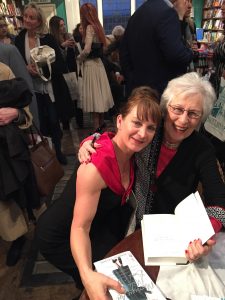 “Just a short note to say how very much I enjoyed Marriages Are Made in Bond Street. I have just finished it – with regret. You really did involve the reader in all the ambitions, hopes and fears of the applicants, and the dedicated and caring approach of those they consulted at the Bureau.”
“Just a short note to say how very much I enjoyed Marriages Are Made in Bond Street. I have just finished it – with regret. You really did involve the reader in all the ambitions, hopes and fears of the applicants, and the dedicated and caring approach of those they consulted at the Bureau.”
Pamela Marsh
“The romantic in all of us will ensure a resounding success for Marriages Are Made in Bond Street!”
Shaun Corry
“Have just finished Penrose’s book. Hugely enjoyed it. Enormous congratulations.”
Christabel Flight
“The book’s a page turner. Limiting myself to one chapter a day to make it last.”
Doreen Skola
“I have been reading the odd bits and pieces of the Marriage Bureau. Splendid. I may add to my Christmas list to send to a couple of fiends, I mean friends.”
Peter Cave
“I LOVED the book. I hope it’s one of those word-of-mouth books that everyone gives everyone else for birthdays and Christmas.”
Ysenda Maxtone Graham
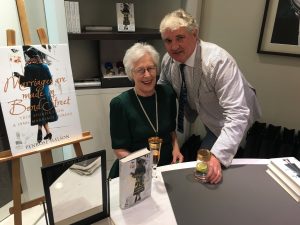 “Many congratulations. I picked up a copy a few days ago and am enjoying it immensely. Your style is excellent.”
“Many congratulations. I picked up a copy a few days ago and am enjoying it immensely. Your style is excellent.”
John Slater
“I am looking forward to finishing it when I get it back from my wife. I am looking forward to the next edition 1949-59”
James Cox
“Thank you for a delightful experience! I absolutely loved your book as did my book club. It is now the top of the list of my favourite books. I will be reading it again as soon as I can get it back from my book club!”
Helen Gordon
“I ordered a copy via Amazon which duly arrived yesterday. Nancy bagged it first and is already giggling. I am sure I shall also enjoy it when given the chance!”
Terry Winter
“I have been very much enjoying the second half of your book, which has knocked Hilary Mantel off my nightly read. I do find yours a fascinating read and v. well written.”
Miles Gibson
“I finished reading Marriages Are Made in Bond Street yesterday and I have to say that I loved it. A brilliant read. I’ve posted a blog about it on my site . . . it had a bit of PG Wodehouse about it! He’s one of my favourite authors.”
Mary Balfour
“I finished the book today and feel a bit bereft as I enjoyed it very much.”
Beverly Davies
“I am just about to begin chapter 5 – captivating reading.”
Richard Reddaway
“I am absolutely loving it! Will make riveting TV watching I would think. I particularly like the way each chapter is a complete story in itself. I received my copy at 1.00 pm on Saturday, and in spite of limited time and visitors I’m up to chapter 12 already (Tuesday). No negatives at all so far, I really think you have made a terrific job of it. Your powers of description are excellent. My mind builds up lovely little pictures of your characters.”
Elisabeth Pestell
“I have just today finished reading Marriages Are Made in Bond Street. What fun, I did enjoy it.”
Christopher Hurrion
“I have been enjoying the book so much and now Gay is reading it. The tone and the approach are just right.”
Muriel Passey
“I have just finished reading your wonderful book. I found it difficult to put down! Your prose and style of writing was a joy to read, thank you so much.”
Michael Donaldson
“I couldn’t wait to get in bed and start reading your book. It’s such fun, so warm, so delightful to read.”
Beverley Segal
“It looks beautiful and it is so well written – “rings so many bells” for me of the 40s/50s. I’m finding it compulsive reading.”
Pat Lloyd
“I started reading “Marriages” on the train home and continued until midnight when I got home. It is riveting and I am enjoying it all. What a talent!”
Helen Varah
“It’s very touching in many ways, terrifying (re Sheikh!) in others, and wonderfully constructive. I couldn’t put it down! Now, I want to know all about Heather’s life – I admire her a lot! You’ve achieved a remarkable portrait of events. Do write another!”
Ivry Freyberg
“I have read your book and thoroughly enjoyed it, congratulations. What a tale, and what remarkable women.”
Anthony Dundas
“Your splendid book came yesterday and I am loving it! Have been somewhat unwell recently and to have a book beautifuly printed as well as splendidly written, with a true story to tell, is excellent medicine.”
Val Pinnington
“I have now read a few chapters of the book and it does give a fascinating insight into the mores of society at a certain time in history.”
Nicholas Edwards
“I just wanted to write and say how much I enjoyed your new book Marriages Are Made in Bond Street. What an extraordinary insight into both the period which has undoubtedly changed and human nature and life, which have not.”
Louise Ross
“Penrose, you are a gifted and delightful writer. I was captivated by your characters (the heartwarming and the scoundrels), their stories, all set in London at a time of great crisis and promise. You made me laugh out loud and ponder the bygone days of marriage arrangements. This book has BBC written all over it. I would recommend putting it in the hands of the producers for “Call the Midwife” immediately. I can easily imagine two or three seasons.”
Greg Kleven
“I liked the story telling and the many little nudges to memory that it gave. To me it was a record of social habits and values nearly forgotten. I was a 15 year old sailor in 1943, had just joined the navy, left school early to do so.”
Chris Bacon